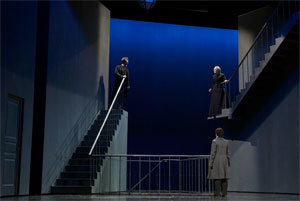Offenbach at the Châtelet (October 08, 2004) DVD: Des Contes d'Hoffmann (January 21, 2005) Tales of Hoffmann in Baltimore (May 2, 2005) Garry Marshall's Grande-Duchesse (September 29, 2005) |
The capital of ancient Gaul has become the Mecca for Offenbach lovers. Through December 7, in four different locations, Sergy Dorny has programmed four spectacles that give, through short and well-liked works including Les Contes d'Hoffmann and Les Fées du Rhin, a cross-section of the composer's protean talent, equally at ease in sarcastic operetta and opéra-comique. [...]
In Les Contes d'Hoffmann, [Laurent Pelly] is reunited with his old accomplice Marc Minkowski, with whom he has already produced La Belle Hélène and La Grande Duchesse de Gerolstein in Paris. Premiered in Lausanne in 2003, the staging of this opera, which has no fewer than 59 roles, relies on the sets of Chantal Thomas. By the very skillful movement of sliding panels, the set evolves, creating taverns, bedrooms, or houses in a twilight atmosphere. Mireille Delunsch is singing the four roles of Olympia, Antonia, Giulietta, and Stella, who personify the same feminine ideal. This is a vocal coup, which requires the highest role to be transposed down but which gives a veritable dramatic force to the opera. Laurent Nouari brings enormous presence and a bronze-timbered voice to the four avatars of the devil. Minkowski's conducting, alert and precise, energized the Orchestre de l'Opéra, earning the support of the audience.
 Renaud Machart wrote a longer and more in-depth review (L'esprit d'Offenbach à Lyon, November 29) for Le Monde (my translation):
Renaud Machart wrote a longer and more in-depth review (L'esprit d'Offenbach à Lyon, November 29) for Le Monde (my translation):Today Offenbach suffers from two problems. First, the scores: for a long time in an undescribably bad state, they are now been critically edited for the English company Boosey and Hawkes, notably by Jean-Christophe Keck. For example, this French musicologist has restored the original version of Les Contes d'Hoffmann, with spoken dialogues and added arias. He is also responsible for the restoration of Les Fées du Rhin.This treatment of Offenbach is not limited to France, judging by how Garry Marshall sitcomized La Grande-Duchesse de Gerolstein in Los Angeles and what Washington National Opera did to Lehár's The Merry Widow.
The second problem is directors. Since leaders of French houses have an annoying tendency to turn to the same successful directors again and again, Laurent Pelly and Agathe Mélinand (who adapted the dialogue and is responsible for dramaturgy) have become for Offenbach what Maritie and Gilbert Carpentier were for Saturday night variety shows on French television. They are everywhere, with the same basic ingredients, in the little one-act operas given in Lyon as in La Belle Hélène or La Grande duchesse de Gérolstein, seen at the Théâtre du Châtelet in recent seasons. Agathe Mélinand sprinkles vulgar language and "fashionable" expressions, which makes sense in principle (Offenbach soaked up everything of his age), but it often rings false.
No comments:
Post a Comment